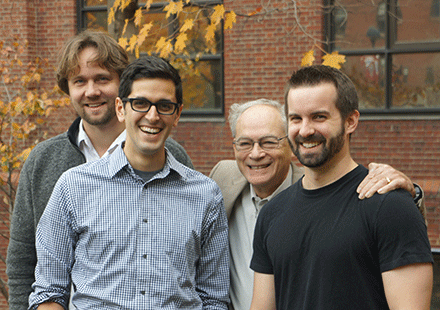Bacillus subtilis is a bacterium with many talents. Some cells devote themselves to exploration, abandoning their relatives to live as swimming ‘motile’ cells. Others instead choose a cooperative, community-oriented lifestyle by clinging to their neighbors to form connected ‘chains’ of cells. Though the two lifestyles are well-known to microbiologists, the factors guiding the decision remain mysterious. Do the cells pick a lifestyle on a whim, or can they retain some memory of the past that influences what they do next?
Using a technique called microfluidics, we constructed thousands of tiny habitats where individual bacteria could be watched for very long periods of time. With this new tool, we could ask whether cells take their history into account when deciding which lifestyle to adopt. Surprisingly, motile cells decided to switch lifestyles in a completely random fashion— some ‘family trees’ would remain motile for only a handful of generations, while others remained motile for hundreds. In contrast, cells were very picky about how long they grew as chains, persisting for almost exactly eight generations, as though they were guided by some sort of internal clock.
The cells have good reason to tightly control the time spent chaining. Chains represent the earliest step in the construction of multicellular communities known as biofilms. Building a biofilm requires cooperation—the community can’t grow successfully if cells casually jump ship. By making the decision to form chains into a sort of ‘family tradition’, a founding individual ensures that its relatives follow suit. This ‘tradition’ elegantly manages risks of founding a community by giving the cells a chance to reevaluate their decision after achieving a critical mass. If things are going well, other factors can take over and guide the project to completion. On the other hand, if things went poorly, all of the cells abandon the community simultaneously, leaving them free to search out a better home.Contributors:
The study was carried out jointly between the labs of Richard Losick (Molecular and Cellular Biology, Harvard University) and Johan Paulsson (Systems Biology, Harvard Medical School) by graduate students Thomas Norman (Losick and Paulsson labs) and Nathan Lord (Paulsson lab).


